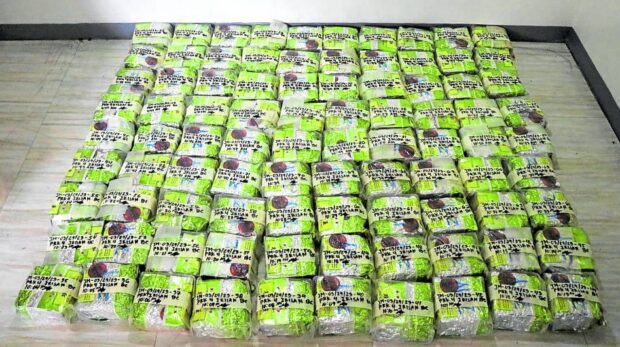Chinese nabbed in Baguio over P4-billion ‘shabu’ in teabags

EVIDENCE | The packs of “shabu” (crystal meth) seized from the rented apartment of a Chinese man in Baguio City on Wednesday are properly marked and documented so these can be presented as evidence in court. (Photo from the Cordillera Police Regional Office)
BAGUIO CITY, Benguet, Philippines — A 51-year-old Chinese man was arrested here on Wednesday after authorities found more than 500 kilograms of “shabu” (crystal meth), valued at P4 billion during a raid on his house, police said.
According to the Cordillera police, Ming Hui, alias “Tan,” was caught in possession of illegal drugs that were packed in teabags, bearing Chinese characters. In a report, Brig. Gen. David Peredo, Cordillera police director, said the contraband was found at a warehouse inside the suspect’s rented apartment in Barangay Irisan.
About 575 kg of shabu were recovered during the operation led by the combined units of the regional police, the Philippine National Police’s Drug Enforcement Group, the Philippine Drug Enforcement Agency (PDEA), and the National Bureau of Investigation.
Peredo said the drug haul was the biggest to date in the city and the entire Cordillera.
The operation was carried out on the strength of a search warrant issued by Judge Rufus Gayo Malecdan Jr. of the Regional Trial Court here. Ming will face charges for violation of the Comprehensive Dangerous Drugs Act of 2002.
Article continues after this advertisementInterior Secretary Benhur Abalos Jr., who inspected the haul, said the Department of the Interior and Local Government and the PNP had coordinated with Cordillera officials before conducting the operation.
Article continues after this advertisementHe said the seizure was the result of a continuing operation of the National Capital Region police and the PDEA.
“This is the [result] of a whole-of-nation or whole-of-government approach,” Abalos told reporters.
Storage
The teabags found in the Baguio raid, however, were similar to those seized by authorities in Manila in October last year. In that operation, some 990 kg of shabu, worth P6.7 billion, were confiscated, which was considered one of the largest hauls in the history of police drug enforcement. When asked, Abalos said they were still investigating the contraband’s source.
But he noted that the seized drugs were not intended to be distributed within the Cordillera, but in other regions in the country.
Abalos said the warehouse might just be a storage facility. “We cannot really tell yet, why [the drugs] were here in Baguio City. It’s part of our ongoing investigation, but we are looking into the angle that they have strategic locations for a certain area. We cannot tell yet if the drugs were manufactured in a nearby area, or if the drugs were just dropped here until they were distributed,” he said.
Asked to comment on the discovery of illegal drugs in Baguio, Mayor Benjamin Magalong, a retired police general, said: “The intensified anti-drug campaign of the government, especially in Metro Manila, is really unsettling for drug syndicates. That’s why they are looking for places where they could conceal their storage of illegal drugs.”
According to PDEA data in December last year, the Cordillera region posted the lowest “drug affectation” among the country’s 17 regions at 4.24 percent.
As of January, the Cordillera police reported that only 39 barangays, or 3.3 percent of 1,176 barangays in the region, remained affected by illegal drugs. These were mostly in Benguet and Kalinga provinces, where marijuana is still cultivated in mountainous areas.
In response to the consecutive seizures of large volumes of drugs in the country, Abalos said his agency was “monitoring the performance of each and every regional director and each of every provincial director” in the PNP.
“The order from the top is intense,” he said, referring to directives from President Marcos to address the problem of illegal drugs in the country.
Out of the 42,046 barangays across the nation, 9,860 or 23.45 percent remain affected by illegal drugs, the PDEA said.